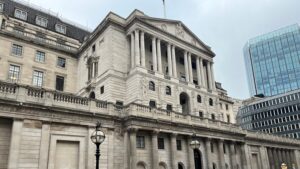The price of gold has fallen by 28%; the share price of the mining companies has fallen by 53%; investors have taken £26bn out of gold ETFs so far this year; ETF investments in physical gold are close to 60% from their peak; and the HSBC Global Golf Index of the biggest gold miners on the planet has fallen by 60% in the past two years.
As Hargreaves Lansdown’s senior investment analyst Adrian Lowcock says: “The biggest challenge to gold continues to be trying to place a value on it – is it worth $1,800 or $800 an ounce? The answer is it could be both as the value of gold moves with changes in perception.”
Lowcock also posits that as the market remains cautious on miners and momentum stays negative, gold could continue to fall in price.
Given the numbers above, and a continuing fall in sentiment, gold’s safe haven status right now is well and truly shot to pieces (Charles Stanley Direct’s Rob Morgan describes it as “tarnished”).
As is another reason to own it – as an inflation hedge.
Always believe in your soul
Inflation in the UK is falling (today’s figures show it is down to 2.1%) so owning gold as an inflation hedge has, in Morgan’s words, been “unwarranted” yet you know that some UK wealth managers continue to hold gold for this exact reason.
Inflation will undoubtedly come back – deflation is as big a potential problem in the short term – but it is a long-term consideration so holding gold as a hedge against it now seems too soon.
A third reason to hold gold is to benefit from the biggest gold consumers – in India and China – pushing its price up. The World Gold Council shows demand from these two countries alone growing by 50% year-on-year while, according to Gary Dugan, chief investment officer, Asia and Middle East, at Coutts, says that sales of physical gold have picked up recently with demand up 78% year-on-year in Q2.
Given the region his job title suggests he has expertise in, Dugan is better placed than some to talk about a fourth reason to hold gold – as a hedge against political problems in the area.
“Gold has recovered some poise after its collapse last year, supported by mounting geopolitical tensions in the Middle East, weakening emerging-market currencies and improved underlying demand,” he argues.
You're indestructible
“The likelihood of US intervention in the Syrian conflict has increased following growing allegations that the Assad regime used chemical weapons against its opponents. This adds further geopolitical risk into financial markets – gold is one of the few ways to hedge against the downside risk to portfolios from such geopolitical tensions.”
Interestingly, he describes the correlation between gold and inflation as “somewhat tenuous”.
Where all three of these analysts agree is that, while there are pros and cons to owning gold right now, it still possesses long-term benefits for a client portfolio.
Morgan: ““On the corporate front too we could be entering a more constructive phase where well-managed miners add shareholder value through better capital allocation. However, this takes time and cannot be expected to yield results overnight."
Lowcock: “All in all, gold looks to be a risky investment going into 2014 but it is likely to be a very topical one as well. Investors would be best to hold gold as that insurance policy against bad news and hope they do not need it.
“At present I would only suggest drip-feeding money into the asset class while the negative trend continues.
Always believe in, because you are…Gold
Dugan is the most positive if the three, again largely because of his jurisdiction.
And my view? The demand for gold will definitely go up on the short term – but only because it’s Christmas – while the longer-term story could be brought forward dramatically to the day after the Fed starts to taper QE (this week if you believe David Lebovitz, global market strategist at JP Morgan Asset Management) and the inflation bears are given their voice.







